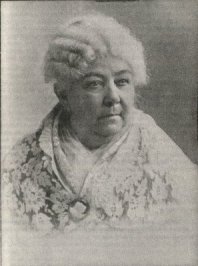

Genesis xxix, xxxi.
WHILE Laban played his petty deceptions on Jacob, the latter proved himself in fraud and overreaching fully his match. In being compelled to labor fourteen years for Rachel instead of seven, as agreed upon, he amply avenged himself in getting possession of all Laban's best cattle, availing himself of the physiological law in breeding of which Laban was profoundly ignorant.
The parting of Jacob and Laban was not amicable, although they did not come to an open rupture. Rachel's character for theft and deception is still further illustrated. Having stolen her father's images and hidden them under the camel's saddles and furniture, and sat thereon, when her father came to search for the images, which he valued highly, she said she was too ill to rise, so she calmly kept her seat, while the tent was searched and nothing found, thus by act as well as word, deceiving her father.
Jacob and his wives alike seemed to think Laban fair game for fraud and deception, As Laban knew his images were gone, he was left to suspect that Jacob knew where they were, so little regard had Rachel for the reputation of her husband. In making a God after their own image, who approved of whatever they did, the Jews did not differ much from ourselves; the men of our day talk too as if they reflected the opinions of Jehovah on the vital questions of the hour. In our late civil war both armies carried the Bible in their knapsacks, and both alike prayed to the same God for victory, as if he could be in favor of slavery and against it at the same time.
Like the women, too, who are working and praying for woman suffrage, both in the state legislature and in their closets, and other against it, to the same God and legislative assembly. One must accept the conclusion that their aquaintance with the Lord was quite as limited as our own in this century, and that they were governed by their own desires and judgment, whether for good or evil, just as we are; their plans by day and their dreams by night have no deeper significance than our own. Some writers say that the constant interposition of God in their behalf was because they needed his special care and attention. But the irregularity and ignorance of their lives show clearly that their guiding hand was of human origin. If the Jewish account is true, then the God of the Hebrews fall far short of the Christian ideal of a good, true manhood, and the Christian ideal as set forth in the New Testament falls short of our ideal of the Heavenly Father to-day. We have no fault to find with the Bible as a mere history of an ignorant, undeveloped people, but when special inspiration is claimed for the historian we must judge of its merits by the moral standard of to-day, and the refinement of the writer by the questionable language in which he clothes his descriptions.
We have often wondered that the revising committees that have gone over these documents so often, should have adhered so closely to such gross translations. Surely a fact related to us in a coarse language, is not less a fact when repeated in choice, words. We need an expurgated edition of most of the books called holy before they are fit to place in the hands of the rising generation.
Some members of the Revising Committee write me in that tone of some of my comments should be more reverent in criticising the "Word of God". Does any one at this stage of civilization think the Bible was written by the finger of God, that the Old and New Testaments emanated from the highest divine thought in the universe? Do they think that all the men who wrote the different books were specially inspired, and that all the various revising committees that have translated, interpolated, rejected some books and accepted others, who have dug around the roots of the Greek and Hebrew to find out the true meaning, have one and all been watched and guided in their literary labors by the great spirit of the universe, who by immutable law holds the solar system in place, every planet steadily moving in its own elliptic, worlds upon worlds revolving in order and harmony?
These great object-lessons in nature and the efforts of the soul to fathom the incomprehensible, are more inspiring than any written page. To this "Word of God" I bow with reverence, and I can find no language too exalted to express my love, my faith, my admiration.
To criticise the peccadilloes of Sarah, Rebekah, and Rachel does not shadow the virtues of Deborah, Huldah, and Vashti; to condemn the laws and customs of the Jews as recorded in the book of Genesis, does not destroy the force of the golden rule and the ten commandments. Parts of the Bible are so true, so grand, so beautiful, that it is a pity it should have been bound in the same volume with sentiments and descriptions so gross and immoral.
E.C.S.